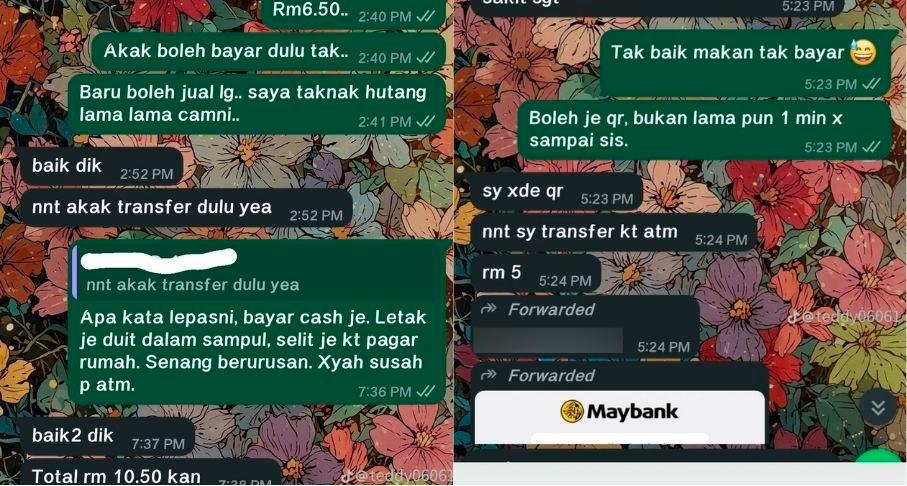A kuih seller recently shared her frustrations with a customer after noticing that she allegedly often failed to pay for her purchases.
“Please don’t say things like ‘it’s just RM5’ or ‘just RM10, don’t be so petty,’ because even RM1 means a lot to me. This is my hard-earned money from doing business,” the seller said in a Threads post.
The housewife’s post exposed the customer’s alleged behaviour, including screenshots showing delayed payments, with the customer often opting for online bank transfers as her preferred mode of payment.
The first incident reportedly involved the customer owing the home-based entrepreneur RM5 last month.
To make matters worse, the seller claimed she had to chase the customer for several days just to recover the RM5.
On another occasion, the customer allegedly failed to pay for five pieces of kuih, once again postponing the payment to the following day.
The next day, the customer attempted to place another order — this time for dumplings. However, the seller insisted that the customer pay first before any delivery was made, stating that she did not want to “accumulate her debt.”
In their most recent exchange, believed to have occurred last week, the seller finally put her foot down and suggested that the customer pay in cash for her order, which, according to the screenshot, came up to RM10.50.
“Put the cash in an envelope and just slot it on your house gate. It’s a lot easier to deal with, and there’s no need to go through the trouble of going to the ATM,” the seller told the customer in the screenshot.
In a further update, the seller added that the customer claimed she did not know how to use a QR code for payment — a claim the seller questioned, pointing out that the customer does affiliate marketing on social media.
The seller criticised these excuses, stating that in this day and age, everyone should know how to use QR payments and that there should be no justification for late or missing payments.
Many netizens stood in solidarity with the kuih seller, calling for stricter payment policies and better awareness among buyers about how delayed payments can impact small businesses.
“Same here. And the one who didn’t pay is a business owner herself. She should understand how important it is for small business owners like us. In the end, we just let it go because they kept giving excuses for not paying — and the total came up to nearly RM100,” one user said.
“In business, it doesn’t matter if it’s a sibling, neighbour, niece, or even a distant relative — if you want something, you pay first, then get the product,” another noted.
One user also advised the seller to block the customer once the payment had been settled, to avoid any future dealings.
Others suggested implementing a strict payment system so that the seller would no longer have to deal with similar problems and could more easily filter out dishonest customers.









